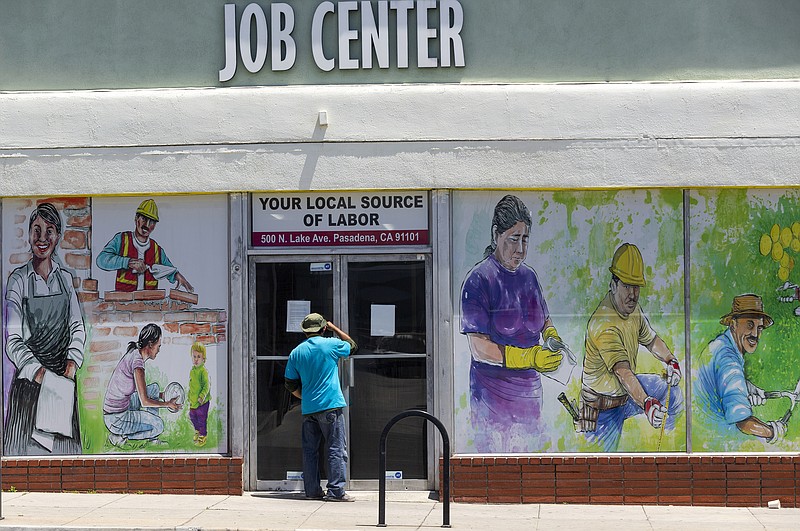Nearly 10,000 Georgians have returned to work in the past five months but continue to request jobless benefits from the state, the Georgia Department of Labor said Thursday.
"We are now having to address potential fraud on a phenomenal scale due to some claimants failing to disclose wages and additional work history," said Mark Butler, commissioner for Georgia's Department of Labor. "It's good to see Georgians go back to work, but it is critical that employees report these wages to us to avoid overpayments and potential legal action."
Buoyed by extra federal stimulus payments for unemployed persons, Georgia has paid more than $19 billion in unemployment insurance benefits over the past year from nearly 4.5 million claims filed by unemployed Georgians sometime during the past 12 months. While the number of improper claims for unemployment benefits from those now working represents a small fraction of all those applying for benefits, Butler said the fraudulent claims complicate the payment of benefits and slows down the processing of legitimate claims.
Individuals filing for unemployment insurance benefits must report any earnings for each week they work. The Georgia Labor Department utilizes a quarterly wage cross-match system that alerts the agency to wages reported by employers, but not reported by claimants.
"Reporting false information on your weekly certifications is against the law and we are required to investigate any instances of potential fraud identified during wage cross-matches," Butler said.
Each week claimants are asked to certify if they were able and available for work, if they refused any work offered during the week, and if they worked or earned any wages. If a claimant selects "No" for the question regarding work and wages, but a quarterly wage cross-match or an employer new hire report shows that this information is not factual, the claimant is contacted to provide additional information on the wages and work history.
If the state determines a claimant was paid unemployment benefits he or she should not have received, the claimant is required to repay the money, including any income taxes that were withheld. The state will then determine whether the mistake was deliberate or unintentional to determine if criminal penalties may be pursued.
Although the economy is showing signs of improvement, the number of Georgians filing for unemployment benefits rose again last week by 2,940 to 28,387. Georgia currently has 340,501 active unemployment assistance cases.
Butler said his department is listing more than 190,000 open jobs in Georgia, although many of the available jobs may not match the skills, interest or even location of those who are unemployed.
Nationwide, initial jobless claims also rose last week by 9,000 to 745,000. Though the pace of layoffs has eased since the year began, they remain high by historical standards. Before the virus flattened the U.S. economy a year ago, applications for unemployment aid had never topped 700,000 in any week, even during the Great Recession.
"Although we can almost taste improvement in the economy likely coming, we're not there yet as we look at the latest claims numbers," said Mark Hamricks, senior economic analyst at Bankrate.com. "The total number of individuals on some form of unemployment assistance remains massive."
All told, 4.3 million Americans are receiving traditional state unemployment benefits. Counting supplemental federal unemployment programs that were established to soften the economic damage from the virus, an estimated 18 million people are collecting some form of jobless aid.
In Tennessee, the number of new jobless filings fell last week by 1,742 from the previous week, but the 10,335 newly unemployed persons filing for unemployment relief is still an elevated number by historical standards. The new jobless filings included 378 newly laid off workers in Hamilton County and 186 persons added to the jobless rolls in Bradley County last week.
"The source of all labor market damage continues to be COVID-19," said AnnElizabeth Konkel, economist at the Indeed Hiring Lab. "Increased vaccine distribution is promising, since the public health situation must improve for there to be a full economic recovery. When we completely return to 'normal' is still unknown."
The data firm Womply reports that 64% of movie theaters and other entertainment venues, 40% of bars and 34% of hair salons and beauty shops are closed. And on Wednesday, the Federal Reserve reported that across the country, "overall conditions in the leisure and hospitality sector continued to be restrained by ongoing COVID-19 restrictions."
Despite continued weakness in parts of the economy, the Tennessee Department of Labor and Workforce Development listed 267,357 open jobs on its website (www.jobs4tn.gov) on Thursday.
The Associated Press contributed to this report.
Contact Dave Flessner at dflessner@timesfreepress.com or at 757-6340
